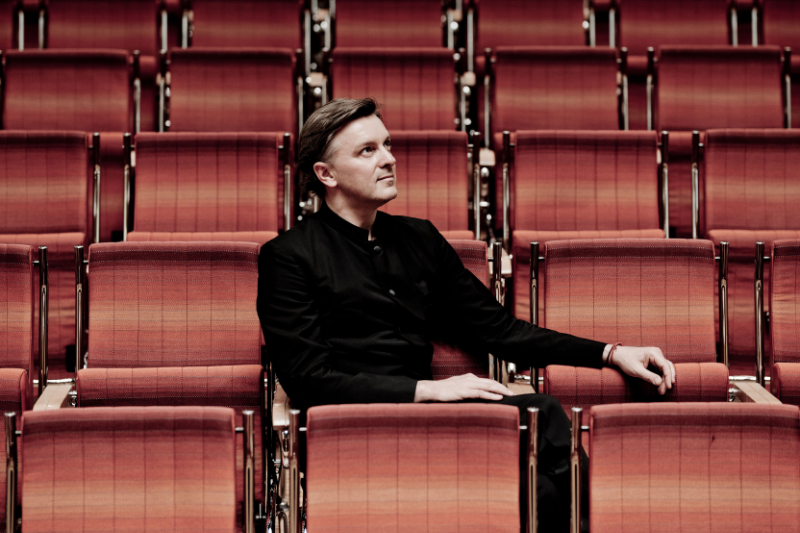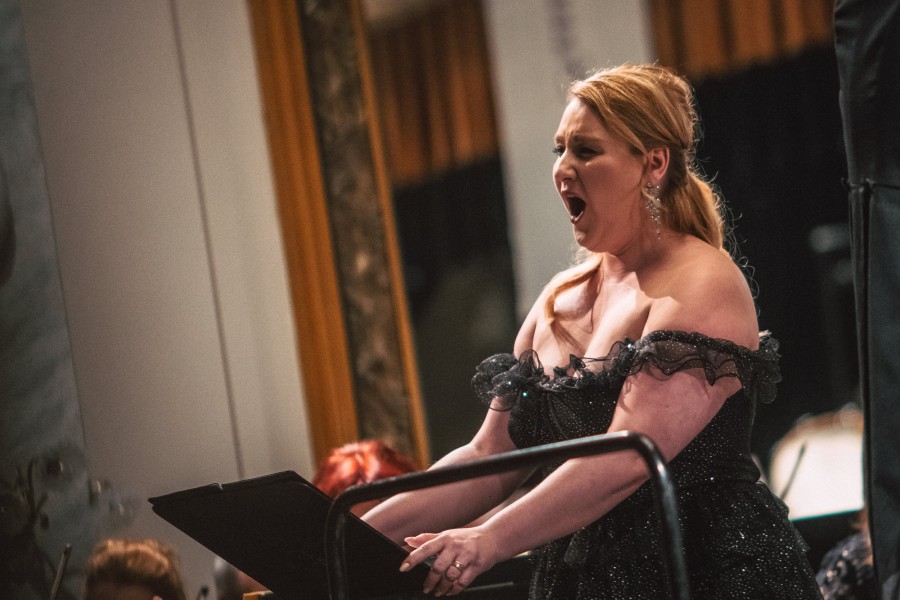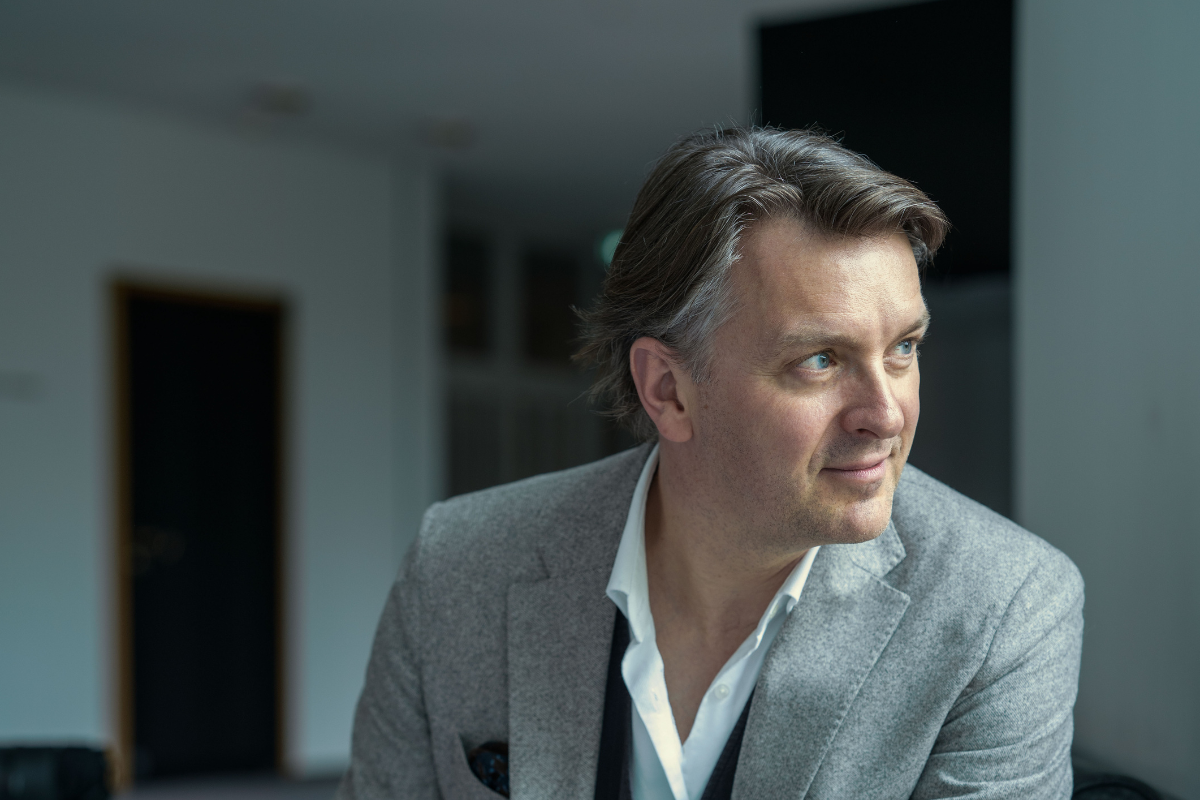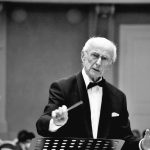interview by Anna Šerých
On 9th of April 2025 the Prague Symphony Orchestra FOK where the newly designated chief conductor, Tomáš Netopil, officially introduced the orchestra’s programme for the upcoming season. A world-renowned conductor with remarkable versatility and interpretive depth, Netopil is transitioning from his current role as principal guest conductor of the Czech Philharmonic. What are his aspirations as a conductor? What vision does he bring to Prague’s symphonic future? And which masters of composition have shaped his musical path? PhDr. Anna Šerých sought the answers to these and more.
It’s wonderful news that you’ll be taking the helm of FOK next season. What guiding motto will you carve into your symbolic coat of arms as chief conductor?
The direction I wish to take with the orchestra is already evident in the programming for the upcoming season. Alongside works by the great symphonic masters, I also want to shine a spotlight on Czech composers who absolutely deserve more recognition. In the first two seasons – and already at my inaugural concert – we will feature music by Jan Hanuš.
But to return to your question: I see this extraordinary opportunity and the close collaboration with the orchestra as a chance to actively foster and nurture cultural values in our society and to share the most beautiful musical experiences possible. FOK holds a strong place not only in Prague and the Czech Republic, but through its history has earned a respected position in the broader musical world. I hope to help that legacy flourish.
You mentioned the moral and professional stature of composer Jan Hanuš. You’ll be presenting Salt over Gold, a suite drawn from the music for his successful ballet. Hanuš himself discusses this work in his remarkable memoir The Labyrinth of the World, and there’s even a now 70-year-old recording conducted by Karel Ančerl. What led you to choose this particular piece?
I first came across the music of Jan Hanuš as a student during my first year at the conservatory. when we took part in a concert project at the Forfest Festival in Kroměříž, performing his spiritual piece The Song of Brother Sun. He attended the concert, and though I hadn’t known his work before, his presence alone, filled with grace and quiet dignity, left a lasting impression on me. A few years later, during my studies at the Academy of Performing Arts in Prague, we met again – and that meeting remains etched in my memory, once more I was struck by the extraordinary strength and humanity he radiated. Very often during my work trips and in my studies in general, I try to discover new or forgotten works, and one of them was Jan Hanuš’s magnificent suite Salt over Gold. I was so captivated by it that I knew I had to conduct it one day, even before I knew it would be with the Prague Symphony Orchestra.
At the beginning of this year, you conducted several premieres of contemporary composers’ works: in Brno, Confluere by Lithuanian composer Justė Janulytė; in Antwerp, the premiere of the symphonic work Le tombeau de Josquin by Belgian composer Piet Swerts; and in Prague with the Czech Philharmonic, two world premieres of pieces commissioned by the orchestra – Labyrinth of Memory by Jiří Teml and the cello concerto The Recovery of Paradise by British composer Richard Blackford, who has maintained a long-standing creative connection with the Czech Republic. Is it important for you to know the composer personally when preparing a piece?
Absolutely. Personal engagement, ideally during the preparatory phase of rehearsals, provides irreplaceable insight – not only aiding my own interpretative choices and the orchestra’s understanding, but also benefiting the composer in the realisation of their intentions. While rehearsing a new piece, we can engage in discussions about the work and collaboratively address problematic areas, which often arise during such moments as a world premiere. I’ve been fortunate throughout my career to work with composers who were open to collaboration and willing to shape their compositions together with me. Every time I have a living composer present, I imagine what it would be like to discuss interpretation directly with Janáček, Dvořák, or Mozart.
To a newcomer setting foot into the landscape of “classical” music, how would you characterize the musical expression of today’s composers?
I wouldn’t presume to generalize. Each composer is a unique voice, crafting their own musical idiom from a palette of deeply personal elements. Contemporary composers, much like writers or filmmakers, are above all storytellers. For their musical “novels” or “films,” they draw upon a vast and varied sonic vocabulary – one that finds inspiration in the modern world, in historical contexts, in the fusion of musical genres, or in the intersection of different artistic movements.
March was dedicated to opera in Cologne, where you directed Mozart’s Don Giovanni. You’ve had this piece in your repertoire for many years and in various productions. How has your relationship with this opera evolved over time?
This opera is one of my absolute favorites. I can’t think of a single moment in it that feels weak or would benefit from a musical or dramatic revision. I find myself increasingly fascinated by Mozart’s sense of humor and his unique way of portraying each character. With Mozart, there’s a striking ease and natural flow in his writing. Especially in Don Giovanni and The Marriage of Figaro, I sense the joy he must have felt while composing and bringing these characters to life.
You’ve made a number of recordings, many of which are devoted to Janáček. With SOČR, you’ve recorded his orchestral Sinfonietta, The Fiddler’s Child, the rhapsody Taras Bulba, the symphonic poem The Ballad of Blaník, and other albums include suites from the operas Jenůfa, Káťa Kabanová, and Destiny. The orchestral suites from Janáček’s operas were mostly arranged by conductors – Václav Talich, deeply respected by Janáček himself, was the first to arrange music from The Cunning Little Vixen, followed by Václav Smetáček. František Jílek crafted suites from From the House of the Dead and Destiny, while Jenůfa was arranged by Tomáš Ille and Káťa Kabanová by Jaroslav Smolka. Further suite projects were initiated by Sir Charles Mackerras and Manfred Honeck. Have you ever been tempted to arrange a suite yourself from one of Janáček’s lesser-known operas?
I would actually prefer to remain in the role of initiator. Together with Tomáš Ille – a longtime friend since our student days at the Kroměříž Conservatory and later in Prague – we shaped the dramaturgical arc of a new suite from The Makropulos Affair. Tomáš created a stunning suite, which I had the honor of conducting at the Janáček Brno festival in 2022, and again the following year with the Czech Philharmonic.

Your recording of Janáček’s Glagolitic Mass is extraordinary – the world premiere of the composer’s original 1927 version, edited by Jiří Zahrádka. It is paired with the cantata The Eternal Gospel, which Janáček composed to a text by Jaroslav Vrchlický. The composer felt a strong affinity with Vrchlický, even transcribing the speech melodies of his verse. he cantata is inspired by a vision of the medieval theologian Joachim of Fiore – a promise of the coming of the Age of the Holy Spirit, an age of love for all creation, a vision that aligned closely with with Janáček’s own pantheistic worldview. Premiered during the turmoil of the First World War, the cantata garnered significant attention and was even performed at a celebratory concert for Janáček’s 70th birthday, with President Masaryk among those offering congratulations. How does The Eternal Gospel resonate with today’s world and how would you describe the musical language of this passionate dramatist?
The message of The Eternal Gospel – love for all creation – remains just as urgent and relevant today as it was at the time of its premiere. The music bears Janáček’s unmistakable melodic fingerprint, supported by imaginative and richly detailed orchestration. It sets in motion a vivid dialogue between orchestra, choir, and soloists. I believe Janáček intentionally emphasizes horizontal musical development and deliberately avoids fragmentation or restlessness in the musical flow. In doing so, he succeeds in evoking a spiritual atmosphere that aligns beautifully with the essence of the text.
At this year’s Prague Spring Festival, you’ll appear with Concentus Musicus Wien, a legendary period-instrument ensemble founded by Nikolaus Harnoncourt. This marks their second visit to Prague; the first was in 2001 with Harnoncourt himself. Your program is truly outstanding: František Xaver Richter’s Sinfonia con fuga in G minor, Mozart’s motet Exsultate, jubilate, and the Requiem in D minor. The vocal part in Exsultate was originally written by Mozart for a castrato. Will you be engaging a countertenor for the sake of historical authenticity?
We’ve opted not to – the soloist will be Czech soprano Markéta Klaudová. We’ve collaborated before on several Mozart projects, and I find her to be the perfect artist for this repertoire. She brings a distinctive interpretative voice that I believe will do the piece full justice.

It’s clear that the Viennese musicians hold you in high regard – you already opened the Concentus Moraviae Festival together in May 2023. What do you find enriching about working with such a highly specialized ensemble?
Beyond the fact that they are electrifying, open-minded, and deeply inspiring musicians, every encounter with them brings me immense artistic nourishment. I enjoy exploring the subtle interplay between baroque and modern orchestral interpretation – seeking a musical aesthetic that transcends instrumental boundaries and always returns to the ultimate common ground: the composer.
Your hometown is Kroměříž – a city whose Baroque heritage includes one of Europe’s most significant 17th-century music archives. Do you envision incorporating works by composers such as Pavel Vejvanovský into your chamber programming with the Prague Symphony Orchestra? Might we even see you take on the dual role of maestro di capella and violinist?
A synthesis of these elements is certainly envisioned, though at present, our efforts remain focused on conceptual exploration and defining the most coherent dramaturgical framework for this collaboration.
You’ll conduct Smetana’s Má vlast for the Republic Day Concert on October 28 – a work you’ve performed memorably many times, including with the Czech Philharmonic at the Litomyšl festival, and with the FOK Orchestra in a landmark live recording from the 2008 concert marking the 90th anniversary of Czechoslovakia’s founding. You’ve also presented the cycle abroad – your video recording with the Orchestra del Teatro Regio di Parma dates back to 2006. Do you keep a record of all the places around the world where you’ve performed Má vlast?
Sadly, I don’t keep a detailed performance log, though there have been numerous occasions across the globe. Foreign orchestras often request just the first three symphonic poems of the cycle – they make for a powerful second half of a concert. Just last year, I performed Má vlast in Amsterdam, Frankfurt, Brisbane, at the Smetana’s Litomyšl festival, and at a special summer concert in Kroměříž with a combined ensemble of the Moravian Philharmonic Olomouc and the Bohuslav Martinů Philharmonic from Zlín.
Do you intend to preserve the tradition of New Year’s concerts featuring Dvořák’s Slavonic Dances with the Prague Symphony Orchestra? At the time of their creation, the Berlin composer and critic Louis Ehlert spontaneously praised them as “divine nature flowing through music.” Dvořák himself wrote to his publisher Simrock about the second set: “…to be honest, I orchestrated them so well that I may say – and I’ve heard a few – they sound like the devil.” What’s your relationship to this delightful concert piece of ours? Do international audiences embrace the complete set as warmly?
I’ve only performed the Slavonic Dances as a full-length concert abroad once – with my orchestra in Essen. It was a tremendous surprise for the musicians and a rich musical harvest. The work is an explosion of endless ideas, catchy melodies, and dazzling orchestration. It’s also one of the more demanding orchestral works, requiring real preparation and deep understanding.
Among your most significant recordings with the Prague Radio Symphony Orchestra are major works by Bohuslav Martinů, such as The Frescoes of Piero della Francesca, The Parables, and The Engravings. You’ve also recorded his Bouquet of Flowers, as well as the Philharmonic Dances by Jan Novák – a somewhat overlooked student of Martinů. Following your Essen-based recording of Ariadne with Simona Šaturová, you now present a scholarly reconstruction of Mariken de Nimègue, an autonomous one-act opera based on Henri Ghéon’s libretto. Martinů began composing it in 1933, initially in collaboration with Czech poet Vítězslav Nezval during a visit in Paris, though the final Czech version was translated by Vilém Závada. Mariken later became the second part of The Plays of Mary. Now, the original, standalone Mariken de Nimègue comes to your conductor’s desk for its premiere performance. What are you most looking forward to?
I can’t wait for the first rehearsal. That moment of initial contact with the sound, the whole rehearsal process… t will mark a thrilling close to our first season together, with a special finale at the Smetana’s Litomyšl Festival, where this newly revisited work will also be performed.
The Prague Symphony Orchestra’s season also features Haydn’s famous oratorio The Creation, this time in a staged performance. Haydn was, throughout his life, closely connected to Czech musicians and friends. His Creation had its very first performance in the Czech lands, thanks to the Vranický brothers, the patronage of Prince Franz Josef Maximilian von Lobkowitz. The oratorio was translated into Czech, and its early performances in Bohemia even preceded many across Europe. A letter from Haydn dated 1801 confirms his warm approval of a planned staging in Svatý Jan near Kočov. The oratorio became deeply rooted in Czech musical life – Smetana himself conducted it in Gothenburg. It’s a work that captivates with its blend of lyrical exaltation and dramatic praise for the Creator, songs of thanksgiving by the archangels Gabriel, Uriel, Raphael, and Adam and Eve, and its evocative orchestral illustrations of the wonders of nature. With which orchestras have you conducted The Creation?
This will actually be my very first time conducting this extraordinary work. It’s a dream I’ve held onto for years, waiting for the right moment and the right constellation of people – and with the involvement of Matěj Forman, those have now aligned.
What draws you to this masterpiece?
To me, it is a radiant tapestry of music, each movement is a testament to Haydn’s compositional ingenuity. For me, the oratorio also serves as a cultural and stylistic milestone, reflecting the transitional aesthetics of the late 18th century – a period marked by interwoven musical, philosophical, and sociopolitical developments. It also offers us a glimpse into the next musical development that will be fully grasped by the next generation of Romantic composers. I am looking forward to this period with Creation because it will be an opportunity for us to explore and engage intensively with the music of the High Classicism period, which is always very beneficial to the orchestra.
The work almost seems to demand a staged interpretation. Did the idea to involve Matěj Forman come from the orchestra or from Mr. Forman himself? Are you planning to make any cuts to the score?
It seems to have been a fortunate coincidence. Just as I had long dreamed of conducting this piece, Matěj Forman had also cherished the idea of bringing it to life on stage. I’ve always admired his work – it’s full of musical intuition and sensitivity. We both feel that the work deserves to be heard in its full form, so making cuts is not something we’re considering.
With its acoustics and architectural grandeur, the Smetana Hall offers an ideal environment for the performance of large-scale vocal-symphonic repertoire. Czech composers of the last century have contributed richly to the oratorio and cantata tradition. Are you planning to bring any of them into your concert programs?
Of course. The Smetana Hall of the Municipal House seems to be destined for grand vocal-instrumental compositions, and we intend to explore this rich repertoire systematically. During my tenure with the Prague Symphony Orchestra it will become a meaningful and regular recurring part of our programming.
Have you already selected composers from whom you plan to commission a piece for the Prague Symphony Orchestra?
I do have a personal wish list – but I’ll keep it to myself for now, as I haven’t yet reached out to the composers I have in mind.
Music – that brilliant code of dots and lines across five staves – is such a powerful language of emotion. Is there one piece that’s closest to your heart?
The older I get, the harder this question becomes. I truly can’t give a definitive answer. Choosing one piece or composer would instantly make me regret not choosing another. And in a way, I’m glad for that – glad to have the luxury of embracing the full spectrum and beauty of music.
Thank you very much for the interview. We eagerly look forward to all your future artistic ventures. With Dr. Václav Smetáček having led the FOK for three full decades, you have a truly beautiful horizon ahead of you.




